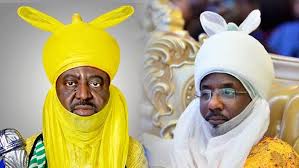The ongoing controversy surrounding the Kano Emirate has taken a new turn, pitting the state government against law enforcement authorities. Governor Abba Kabir Yusuf’s recent order to evict deposed Emir Aminu Ado Bayero from his mini palace has been met with resistance from the Kano State Police Command, led by AIG Usaini Gumel.

This standoff comes in the wake of a Federal High Court ruling that has stirred debate over the legitimacy of recent changes to the emirate system. The court’s decision, which nullified steps taken under the Kano State Emirate Council (Repeal) Law of 2024, has left both sides claiming victory.
AIG Gumel, explaining the police’s refusal to carry out the eviction, cited an ongoing case at the State High Court scheduled for June 24. He argued that acting on the governor’s order would be premature and potentially prejudice the court proceedings. This marks the second instance of the police declining to follow Governor Yusuf’s directives regarding the emirate dispute.
The situation has heightened tensions in Kano, with increased security presence around the Nasarawa mini palace where Bayero currently resides. Major routes to the palace have been blocked off, as Bayero remains inside with his guards and supporters.
Adding to the complexity, a Certified True Copy of the Federal High Court judgment confirms the removal of the previously reinstated Emir Muhammadu Sanusi. This aspect of the ruling has further muddied the waters of the emirate succession dispute.
Legal experts are calling for all parties to respect the court’s decision, emphasizing that the judiciary remains the final arbiter in such disputes. They suggest that any disagreement with the ruling should be addressed through proper legal channels, such as appeals to higher courts.
The Kano State government has accused the police of taking sides and following orders from outside the state rather than from the elected governor. This allegation underscores the growing rift between state authorities and law enforcement in handling this sensitive traditional leadership issue.
As the situation unfolds, concerns are rising about potential unrest in Kano, a city known for its political and cultural significance. The emirate dispute has not only become a legal battle but also a test of the relationship between state government, traditional institutions, and federal law enforcement agencies.
With the next court hearing approaching, all eyes are on Kano as stakeholders await further developments in this complex power struggle. The outcome could have far-reaching implications for the balance of power between modern governance structures and traditional leadership in northern Nigeria.




